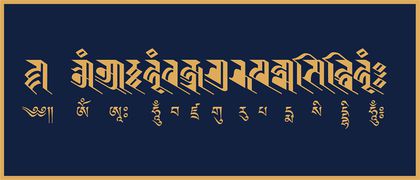Vajra Guru Mantra: Difference between revisions
Jump to navigation
Jump to search
No edit summary |
mNo edit summary |
||
| (7 intermediate revisions by 3 users not shown) | |||
| Line 1: | Line 1: | ||
[[Image:Vajra Guru lanydza.jpg |420px |The Vajra guru Mantra in Lanydza and Tibetan Scripts]] | |||
*The | * The [[twelve-syllable mantra]] of [[Guru Padmasambhava]], [[om]] [[a]] [[hum]] [[vajra]] [[guru]] [[pad ma]] [[siddhi]] [[hum]]. ([[MR-ShabkarNotes]]) | ||
*([[ba dzra]] [[gu ru]] [[sngags]]). [[om]] [[a]] [[hung]] [[vajra]] [[guru]] [[pad ma]] [[siddhi]] [[hung]]. ([[RY]]) | |||
